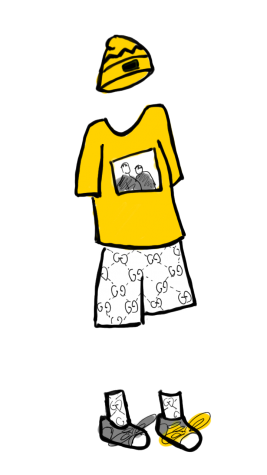The Famed Youth: Dehumanizing children in the entertainment industry
We should support the personal passions and pursuits of young celebrities
November 24, 2019
As high schoolers, our daily routine becomes a balancing act of anxiety-inducing free response tests, tiring sports practices, club activities, boring homework and sometimes sleep. And it’s hard enough to maintain our stressful academic lives while finding our image, confidence and passion.
For 15-year-old actor Millie Bobby Brown, best known for her role as Eleven in the popular TV show “Stranger Things,” her day starts off in a similar way. She goes to school just like the rest of us, except she has to film episode after episode and guest-star on talk shows while constantly maintaining a proper reputation for her millions of fans.

To us, she’s just Eleven, the mysterious character we enjoy watching as she uses her powers to defeat Russians, the Demogorgon and the Mindflayer. Because most of the public only sees Brown for the character she plays, they see no consequence in commenting on her appearance. After posting a picture on Instagram wearing a tight dress, her comments section filled with judgment and hate.
“Don’t be in such a hurry to grow up. Act your own age.”
She chose to refute them, but in truth, why does she have to justify her choice? How do we expect her to “act her age” while we simultaneously impose the real world on her in its most vicious forms?
Adolescence is a time of transition and growth, and part of that is finding the style and fashion that we feel most comfortable with. We look back at our middle school pictures with bright pink shirts and sloppy hairstyles, and cringe immensely now that we’ve discovered more of our personal style. We gave ourselves time to make this transition, so why do we feel obligated to comment on how others make their own transitions and forge their pathways?
While Brown is criticized for dressing in a scandalous manner, 17-year-old pop music star Billie Eilish is known for wearing loose-fitting clothes. In an advertisement for Calvin Klein, Eilish explained her reasons for her style.

“I wear big, baggy clothes. Nobody can have an opinion because they haven’t seen what’s underneath, you know?”
Because of the toxic, misogynistic culture that surrounds the entertainment industry, Eilish feels the need to hide herself from the sexualization of teenage girls — a common convention among celebrities of her age according to the American Journal of Psychiatry. Despite having very different personal styles, as teenage celebrities, Eilish and Brown are constantly bombarded with people’s unwanted opinions. Some tell them to act their age; others implore them to mature faster into their perceived role as women. The comments are endless, conflicting and confusing.
Hate speech has become the go-to method of bias and judgement, when instead we should be showing encouragement through support and constructive criticism.
As teenagers who follow young celebrities and understand the struggles of finding ourselves, we should set a precedent for how individuals should perceive celebrities as what they ultimately are: people. Though they might have millions of followers or be featured in films and music videos, at the end of the day, child celebrities are just that — children, and they’re just as confused and unsure about life as we are.
It’s easy to sit behind a screen and anonymously write a scathing comment or publicly stop supporting a certain influencer because you disagree with their actions. Of course, age doesn’t excuse certain mistakes, depending on their magnitude. However, making mistakes is a necessary step in learning maturity and responsibility, and we can’t expect people our age to understand the world if we don’t give them a chance to experiment freely.
And this doesn’t just apply to appearance or fashion. We’ve dehumanized these celebrities into mere pictures on screens and voices through speakers, and it’s our job as the current generation to support people who represent us — to make sure that they’re kept in check by their audience to an extent, but they still maintain their own happiness and mental health. After all, we’d want the same for ourselves.
Eilish started creating music for the public when she was 13. To put that in perspective, when we were 13, we were in eighth grade and we sure as heck didn’t know what we wanted to do with our lives yet.
So why are we expecting her, as well as so many other child stars, to have life figured out?


















